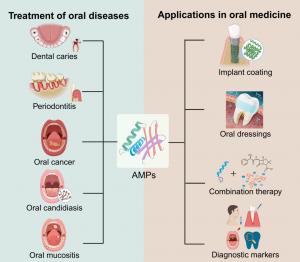预约演示
更新于:2026-02-07
Saralasin Acetate
醋酸肌丙抗增压素
更新于:2026-02-07
概要
基本信息
在研机构- |
权益机构- |
最高研发阶段撤市 |
首次获批日期 美国 (1982-01-01), |
最高研发阶段(中国)- |
特殊审评- |
登录后查看时间轴
结构/序列
分子式C44H71N13O13 |
InChIKeyYBZYNINTWCLDQA-UHKVWXOHSA-N |
CAS号39698-78-7 |
Sequence Code 162243

来源: *****
关联
100 项与 醋酸肌丙抗增压素 相关的临床结果
登录后查看更多信息
100 项与 醋酸肌丙抗增压素 相关的转化医学
登录后查看更多信息
100 项与 醋酸肌丙抗增压素 相关的专利(医药)
登录后查看更多信息
1,286
项与 醋酸肌丙抗增压素 相关的文献(医药)2026-05-01·Biomaterials advances
A novel antimicrobial peptide AH-12 attenuates mitochondrial response to inflammatory stimuli and prevents periodontitis via antibacterial and anti-inflammatory effects
Article
作者: Wang, Yuanchen ; Zhang, Xi ; Zhang, Shuting ; Zhang, Qian ; Sun, Jinrong
Antibiotic-assisted periodontal therapy remains a primary clinical strategy, yet the rising prevalence of bacterial resistance severely compromises its therapeutic efficacy. To address this challenge, antimicrobial peptides (AMPs) have emerged as promising alternatives owing to their distinct antibacterial mechanisms. Here, we developed a novel antimicrobial peptide, AH-12, by systematically optimizing P-113-the minimal inhibitory fragment of human salivary Histatin 5-through N-terminal modification, amidation, and acetylation. In vitro evaluations demonstrated potent inhibitory effects of AH-12 against key oral pathogens (Fusobacterium nucleatum, Porphyromonas gingivalis, and Streptococcus gordonii), achieved via bacterial membrane lysis and suppression of FadA adhesin secretion in F. nucleatum. Beyond its antibacterial properties, AH-12 targeted inflammatory regulation by modulating mitochondrial function. Mitochondria, as early responders to inflammation, drive inflammatory cascades via Ca2+-dependent signaling. Remarkably, AH-12 stabilized mitochondrial Ca2+ levels, thereby attenuating mitochondrial reactive oxygen species (mtROS) overproduction and mitochondrial DNA (mtDNA) release, which collectively contributed to its robust anti-inflammatory effects. In order to minimize the loss of medication during administration and to better fit the shape of the periodontal pockets, a GelMA hydrogel (GelMA@AH-12) was engineered for controlled release applications. In vivo studies validated the outstanding efficacy of GelMA@AH-12, highlighting AH-12 as a transformative candidate for periodontitis treatment.
2025-09-01·COLLOIDS AND SURFACES B-BIOINTERFACES
Injectable laponite nanocomposite hydrogel with synergistic antibacterial and odontogenic activity for endodontic regeneration
Article
作者: Wang, Juan ; Liu, Yuqing ; Ju, Caoyun ; Wang, Yongbin ; Dai, Jiayun ; Hu, Yijie
Persistent pulpitis often leads to irreversible dentin defects and pulp necrosis, posing significant challenges for functional dental restoration. To address the critical limitation of insufficient odontogenic differentiation in dental pulp stem cells (DPSCs), we develop an injectable photo-crosslinking methacrylated hyaluronic acid hydrogel (PLSr2+@HAMA) containing laponite-based ternary nanocomposites which self-assemble by laponite, strontium ions (Sr2+), and antibacterial peptide P-113. We demonstrate that PLSr2+@HAMA features three distinctive advantages: (1) Unique injectability enabling minimally invasive delivery and UV-triggered in situ gelation for anatomical adaptation; (2) Sustained co-release of antimicrobial peptide P-113 and bioactive strontium ions through laponite-mediated orchestrated delivery; (3) Multi-ion and P-113 synergistic action achieving simultaneous infection control and dentin regeneration in several in vitro and in vivo models, promoting endodontic regeneration. By integrating antibacterial action with DPSCs modulation in a single minimally invasive platform, this strategy pioneers a new paradigm for comprehensive endodontic regeneration, demonstrating significant translational potential for inflammatory dental pulp therapy.
2025-07-23·JOURNAL OF AGRICULTURAL AND FOOD CHEMISTRY
Modifying Antifungal Peptides as Safe Food Preservatives
Article
作者: Simons, Eyal ; Israyilova, Aygun ; Hayouka, Zvi ; Malach, Einav ; Yakir, Idan
Food loss and waste (FLW) constitute a major global concern with significant environmental and economic ramifications. A major cause of FLW is fungal contamination, leading to food spoilage. Here, we investigate the use of antimicrobial peptides (AMPs) as a new source for food preservatives to combat filamentous fungi and yeast contamination. Specifically, we focused on two model AMPs, BP100 and P-113, and their derivatives that were designed and synthesized as antifungal agents for food preservation. BP100 and P-113 were modified in order to enhance their efficacy. BP100 was modified by substituting its N-terminal lysine with tryptophan (i.e., BP100 K1W) to extend its hydrophobic α-helical side, and P-113 was extended by synthesizing the original sequence triplicated (i.e., P-113 Triple). The modified peptides demonstrated strong antifungal and antibacterial activities. Importantly, they showed low cytotoxicity and were digestible, indicating their safety for consumption. BP100 K1W was particularly effective in a hummus food matrix model, successfully inhibiting Penicillium expansum's growth and consequently extending the food's shelf life. Thus, this highlights its potential as an effective food preservative and paving the way for future research into peptide-based food preservation strategies.
4
项与 醋酸肌丙抗增压素 相关的新闻(医药)2025-12-13
·搜狐新闻
核心结论[Sar1, Val5, Ala8]-Angiotensin II(通用名:Saralasin,沙拉新)是血管紧张素 II(Ang II)的人工合成类似物,通过氨基酸替换修饰(Sar 替代 Asp1、Val 替代 Ile5、Ala 替代 Phe8)获得,兼具 Ang II 受体拮抗与部分激动活性,是肾素 - 血管紧张素系统(RAS)研究及相关疾病药物研发的关键工具分子,临床曾用于高血压诊断,目前仍广泛应用于基础医学与药物研发领域。一、基本性质英文名称:[Sar1, Val5, Ala8]-Angiotensin II;Saralasin;Sar-Arg-Val-Tyr-Val-His-Pro-Ala单字母多肽序列:Sar-Arg-Val-Tyr-Val-His-Pro-Ala(注:Sar 为肌氨酸,即 N - 甲基甘氨酸,单字母缩写常用 “Sar” 或 “MeGly”,此处采用国际通用的 “Sar” 标识)中文名称:[1 - 肌氨酸,5 - 缬氨酸,8 - 丙氨酸]- 血管紧张素 II;沙拉新等电点(pI):约 7.8-8.2(基于氨基酸组成计算:Arg(+1)、His(pKa≈6.0,中性条件下部分带正电)、其余氨基酸为中性或酸性残基,整体呈弱碱性)CAS 号:12081-75-5(专属化学文摘社编号,唯一标识该多肽)其他关键性质:分子量为 831.97 Da;为白色粉末状固体,易溶于水、生理盐水及酸性缓冲液;稳定性较好,在 pH 4-8 范围内可常温保存数天,长期需 - 20℃冷冻密封储存;二级结构以无规则卷曲为主,与受体结合时可发生构象变化。二、应用领域基础医学研究:肾素 - 血管紧张素系统(RAS)信号通路机制研究(如 Ang II 受体亚型 AT1/AT2 的特异性结合验证);心血管生理调控机制探究(血压调节、血管收缩 / 舒张信号传导)。临床诊断:用于原发性与继发性高血压的鉴别诊断(尤其针对肾性高血压、内分泌性高血压的筛查)。药物研发:Ang II 受体拮抗剂(ARBs)的筛选与活性评价;RAS 相关疾病(高血压、心力衰竭、肾病)候选药物的体外 / 体内实验模型构建。药理学研究:评估药物对 RAS 系统的干预效果,验证血管紧张素转化酶抑制剂(ACEI)、ARBs 等药物的作用靶点特异性。三、应用原理作为 Ang II 的结构类似物,Saralasin 可竞争性结合 Ang II 的主要受体 AT1(亲和力与 Ang II 接近),同时对 AT2 受体也有一定结合活性;其结合后不引发受体完全激活(部分激动效应),可阻断内源性 Ang II 与受体的结合,抑制 RAS 系统的生理 / 病理效应。在诊断应用中,通过静脉输注 Saralasin 后监测血压变化:若为 RAS 依赖性高血压(如肾动脉狭窄),血压会显著下降;非 RAS 依赖性高血压则无明显反应,以此实现病因鉴别。在药物研发中,以 Saralasin 为阳性对照或工具分子,通过检测候选药物对 Ang II - 受体结合的抑制率、对血管收缩的拮抗效果,评估药物的活性与特异性。四、药物研发方向高选择性 AT1 受体拮抗剂:基于 Saralasin 的结构骨架,优化氨基酸序列(如增强 AT1 受体结合特异性、降低部分激动活性),开发无激动效应的强效 ARBs,用于高血压、心力衰竭治疗。双靶点 RAS 抑制剂:设计同时结合 AT1 受体与肾素的杂合多肽,或与 ACEI 联合的复方制剂,实现 RAS 系统多环节阻断,提升降压效果。长效化修饰药物:通过 PEG 化、脂肪酸链修饰等技术,延长 Saralasin 类多肽的体内半衰期,减少给药频次(原 Saralasin 半衰期短,需静脉持续输注)。中枢穿透性 RAS 调节剂:修饰多肽结构以跨越血脑屏障,干预中枢 RAS 系统,用于治疗中枢性高血压、神经源性心血管疾病。五、作用机理自身作用机理:Saralasin 通过模拟 Ang II 的受体结合区域,竞争性占据 AT1 受体的结合位点:一方面阻止内源性 Ang II 与 AT1 受体结合,抑制 Ang II 介导的血管收缩、醛固酮分泌、钠水潴留等升压效应;另一方面,其自身对 AT1 受体具有弱激动活性,可引发轻微的血管收缩反应(部分激动特性),但整体效应以拮抗为主。此外,Saralasin 对 AT2 受体的弱结合可介导血管舒张、抗增殖等保护性效应,进一步调节心血管功能。药物研发作用机理:候选药物基于 Saralasin 的拮抗机制,通过以下方式发挥作用:① 增强 AT1 受体结合亲和力,完全阻断 Ang II 的激动效应;② 特异性结合 AT1 受体,不与 AT2 受体交叉反应,避免非特异性作用;③ 部分药物可通过抑制肾素活性,减少 Ang II 生成,间接降低 Saralasin 所靶向的受体激活水平,形成协同降压效应。六、研究进展基础研究进展:已明确 Saralasin 的部分激动活性源于其与 AT1 受体结合后的构象变化不完全,与 Ang II 诱导的受体激活构象存在差异;通过 X 射线晶体衍射技术解析了 Saralasin-AT1 受体复合物结构,为高选择性 ARBs 的设计提供了结构基础。此外,研究发现 Saralasin 可通过调节血管内皮细胞功能、抑制氧化应激,对缺血性心脏病具有一定保护作用。药物研发进展:基于 Saralasin 结构优化的 ARBs 类药物(如氯沙坦、缬沙坦)已成为临床一线降压药,这类药物保留了 Saralasin 的 AT1 受体拮抗活性,消除了部分激动效应,且口服生物利用度高、半衰期长;目前新型 ARBs(如阿利沙坦)通过前药修饰技术,进一步提升了药物的安全性与耐受性,已获批用于高血压治疗。临床应用进展:Saralasin 虽因半衰期短、需静脉输注等局限性,已逐渐退出常规高血压治疗,但在疑难高血压的病因诊断中仍有应用(如肾动脉狭窄的确诊);此外,其在重症高血压急症的临时降压、RAS 相关罕见病的诊断中仍具有不可替代的价值。七、相关案例分析案例 1:氯沙坦(Losartan)的研发与应用药物类型:非肽类 AT1 受体拮抗剂(基于 Saralasin 的多肽结构优化而来)。研发背景:针对 Saralasin 口服无效、半衰期短的缺陷,通过将多肽结构转化为小分子化合物,保留 AT1 受体拮抗活性,同时改善药代动力学特性。结果:氯沙坦成为首个口服有效的 ARBs,1995 年获批上市,用于治疗高血压、糖尿病肾病等;其作用机制与 Saralasin 一致(竞争性阻断 AT1 受体),但无部分激动活性,降压效果平稳且耐受性好,目前仍是临床常用降压药之一。与 Saralasin 的关联:氯沙坦的研发以 Saralasin 的受体结合位点为靶点模板,通过结构修饰突破了多肽药物的给药限制,验证了 Saralasin 作为药物研发工具分子的核心价值。案例 2:Saralasin 在肾动脉狭窄诊断中的应用临床场景:一名 45 岁男性患者,突发重度高血压(血压 180/110 mmHg),常规降压药治疗效果不佳,怀疑肾动脉狭窄(继发性高血压)。诊断过程:静脉输注 Saralasin(剂量 0.5-10 μg/kg/min),持续监测血压变化;输注后 30 分钟内患者血压降至 140/90 mmHg,降幅超过 20%,结合肾动脉造影结果,确诊为肾动脉狭窄。原理与意义:肾动脉狭窄导致肾缺血,激活 RAS 系统,内源性 Ang II 升高是高血压的核心机制;Saralasin 通过阻断 AT1 受体,抑制 Ang II 的升压效应,从而明确高血压的病因,为后续介入治疗(如肾动脉支架植入)提供依据,体现了 Saralasin 在临床诊断中的独特应用价值。相关产品:Ac-His-Trp-Ala-Val-Gly-His-Leu-NH2 Ac-His-Trp-Ala-Val-Gly-His-Leu-Met-NH2 Ac-Gly-Asp-Phe-Glu-Glu-Ile-Pro-Glu-Glu-Tyr-Leu-Gln Ac-Asp-Arg-Val-Tyr-Ile-His-Pro-Phe-His-Leu-Val-Ile-His-Asn Ac-Tyr-Gly-Gly-Phe-Met-Thr-Ser-Glu-Lys-Ser-Gln-Thr-Pro-Leu-Val-Thr-Leu-Phe-Lys-Asn-Ala-Ile-Ile-Lys-Asn-Ala Ac-Tyr-Gly-Gly-Phe-Met-Thr-Ser-Glu-Lys-Ser-Gln-Thr-Pro-Leu-Val-Thr-Leu-Phe-Lys-Asn-Ala-Ile-Ile-Lys-Asn-Ala-Tyr Ac-Tyr-Gly-Gly-Phe-Met-Thr-Ser-Glu-Lys-Ser-Gln-Thr-Pro-Leu-Val-Thr-Leu-Phe-Lys-Asn-Ala-Ile-Ile-Lys-Asn-Ala-His-Lys-Lys-Gly-Gln Ac-Tyr-Gly-Gly-Phe-Met-Thr-Ser-Glu-Lys-Ser-Gln-Thr-Pro-Leu-Val-Thr-Leu-Phe-Lys-Asn-Ala-Ile-Ile-Lys-Asn-Ala-Tyr-Lys-Lys-Gly-Glu Ac-Tyr-Gly-Gly-Phe-Met-Thr-Ser-Glu-Lys-Ser-Gln-Thr-Pro-Leu-Val-Thr-Leu Ser-Gly-Gln-Ser-Trp-Arg-Pro-Gln-Gly-Arg-Phe-NH2 Lys-Pro-Val-Gly-Lys-Lys-Arg-Arg-Pro-Val-Lys-Val-Tyr-Pro Ser-Tyr-Ser-Met-Glu-His-Phe-Arg-Trp-Gly-Lys-Pro-Val-NH2 Ser-Tyr-Ser-Met-Glu-His-Phe-Arg-Trp-Gly-Lys-Pro-Val-GlySer-Tyr-Ser-Met-Glu-His-Phe-Arg-Trp-Gly-Lys-Pro-Val-Gly-Lys-Lys-Arg-Arg-Pro-Val-Lys-Val-Tyr-Pro Ser-Tyr-Ser-Met-Glu-His-Phe-Arg-Trp-Gly-Lys-Pro-Val-Gly-Lys-Lys-Arg-Arg-Pro-Val-Lys-Val-Tyr-Pro-Asn-Gly-Ala-Glu-Asp-Glu-Ser-Ala-Glu-Ala-Phe-Pro-Leu-Glu-Phe Ser-Tyr-Ser-Met-Glu-His-Phe-Arg-Trp-Gly-Lys-Pro-Val-Gly-Lys-Lys-Arg-Arg-Pro-Val-Lys-Val-Tyr-Pro-Asn-Val-Ala-Glu-Asn-Glu-Ser-Ala-Glu-Ala-Phe-Pro-Leu-Glu-PheVal-Tyr-Pro-Asn-Gly-Ala-Glu-Asp-Glu-Ser-Ala-Glu-Ala-Phe-Pro-Leu-Glu-Phe Ala-Phe-Pro-Leu-Glu-Phe 所有产品仅用作实验室科学研究,不为任何个人用途提供产品和服务。返回搜狐,查看更多
临床2期上市批准临床结果
2025-12-09
GA, UNITED STATES, December 9, 2025 /
EINPresswire.com
/ --
Antimicrobial peptides
(AMPs) exhibit broad-spectrum antimicrobial activity, low propensity to induce bacterial resistance, and multifunctional properties including immunomodulation and tissue regeneration promotion.This study comprehensively reviews the classification, antimicrobial mechanisms, and therapeutic applications of AMPs in major oral diseases such as dental caries, periodontitis, oral cancer, oral candidiasis, and oral mucositis. The research also analyzes key challenges in clinical translation (stability, cytotoxicity, immunogenicity, production costs) and corresponding solutions, while exploring their applications in implant coatings, oral dressings, combination therapy, and diagnostic markers, providing a robust theoretical basis for advancing oral disease treatment.
Oral diseases, including dental caries, periodontitis, and oral cancer, affect approximately 3.5 billion people worldwide. Traditional treatments mainly rely on antibiotics, but the widespread emergence of bacterial resistance has significantly reduced their efficacy. Hence, the need for safe and effective alternative therapies remains.
Antimicrobial peptides (AMPs), key components of the innate immune system, are small-molecule polypeptides widely existing in nature. Unlike traditional antibiotics that target specific metabolic pathways, AMPs primarily act by physically destroying microbial cell membranes—a unique mechanism that minimizes the risk of inducing resistance. Additionally, AMPs possess multiple biological functions such as regulating immune responses, reducing inflammation, and promoting tissue repair, with high biocompatibility to human cells.
In a new study(doi:
https://doi.org/10.1016/j.tdr.2025.100046
) published in Translational Dental Research, a team of researchers from China reviewed AMP classification, antimicrobial mechanisms, and roles in treating oral diseases.
“In the treatment of dental caries, AMPs like Temporin-GHa derivatives, ZXR-2, and GH12 can inhibit the growth of cariogenic bacteria such as Streptococcus mutans, interfere with biofilm formation, and even promote tooth remineralization,” shares senior and co-corresponding author Qiang Feng. “For periodontitis, human-derived AMPs (e.g., α-defensins, β-defensins) and synthetic peptides (e.g., Nal-P-113) effectively kill periodontal pathogens, regulate inflammatory responses by inhibiting pro-inflammatory cytokine secretion, and enhance periodontal tissue regeneration.”
In oral cancer therapy, AMPs such as Piscidin-1 and LL-37 induce cancer cell death through membrane disruption and apoptotic pathways, while also modulating anti-tumor immune responses. “AMPs like P-113 and Nisin A have shown significant efficacy in treating oral candidiasis, and peptides such as IB-367 and Histatin-5 alleviate oral mucositis by inhibiting infection and promoting wound healing,” adds Feng.
Several AMPs have entered clinical trials, including C16G2 for dental caries, Nal-P-113 for periodontitis, and P-113 for oral candidiasis, demonstrating their clinical potential. Beyond direct therapy, AMPs are being developed into implant coatings to prevent peri-implant infections, oral dressings for sustained release, and combined with antibiotics or nanoparticles to enhance therapeutic effects. They also show promise as diagnostic markers for oral diseases by detecting changes in their expression levels.
However, clinical translation of AMPs faces challenges: oral enzymes, pH fluctuations, and high salt concentrations affect their stability; cationic and amphiphilic properties may lead to cytotoxicity and immunogenicity; and large-scale production is costly. “To address these, researchers have developed strategies such as chemical modification (e.g., N-acetylation, lipidation), nanocarrier delivery systems, sequence optimization with D-amino acids, and microbial/plant-based heterologous expression to improve stability, reduce toxicity, and lower production costs,” says Feng. “AMPs' multifunctional properties and low resistance potential make them a game-changer in oral medicine.”
The authors noted that future research should focus on clarifying their interaction mechanisms with oral microbiota and host cells, accelerating peptide screening through artificial intelligence, and developing tailored formulations for the oral microenvironment to promote clinical application.
DOI
10.1016/j.tdr.2025.100046
Original Source URL
https://doi.org/10.1016/j.tdr.2025.100046
Funding information
National Natural Science Foundation of China (82270980), Jinan Periodontitis Innovation Team
(2021GXRC021), Shandong Province Major Innovation Project (2021SFGC0502), Shandong Province Oral Microbiome Innovation Team (2020KJK001).
Lucy Wang
BioDesign Research
email us here
Legal Disclaimer:
EIN Presswire provides this news content "as is" without warranty of any kind. We do not accept any responsibility or liability
for the accuracy, content, images, videos, licenses, completeness, legality, or reliability of the information contained in this
article. If you have any complaints or copyright issues related to this article, kindly contact the author above.

2025-11-23
·有驾
[Sar1, Leu8]-Angiotensin II 详细介绍
[Sar1, Leu8]-Angiotensin II(Sar-Arg-Val-Tyr-Ile-His-Pro-Leu)是血管紧张素 II(Angiotensin II, Ang II)的一种重要类似物,通过对天然Ang II的氨基酸序列进行特异性修饰,使其在生物学活性、稳定性等方面展现出独特优势,广泛应用于心血管生理与药理研究领域。以下从多维度对其进行系统阐述。
一、基本性质
作为经过结构修饰的多肽类化合物,[Sar1, Leu8]-Angiotensin II 的基本性质明确,为其研究与应用提供了基础依据。
1. 英文名称
[Sar1, Leu8]-Angiotensin II;常用简称包括 Saralasin、[Sarcosine1, Leucine8]-Angiotensin II,其中 Saralasin 是其在科研与临床研究中较为通用的名称。
2. 单字母多肽序列
根据其氨基酸组成,单字母多肽序列为:Sar-R-V-Y-I-H-P-Leu。其中“Sar”代表肌氨酸(Sarcosine),是对天然Ang II第1位天冬氨酸(Asp)的替换;第8位则由天然Ang II的苯丙氨酸(Phe)替换为亮氨酸(Leu),这两个关键修饰是其区别于天然Ang II的核心特征。
3. 中文名称
[1-肌氨酸, 8-亮氨酸]-血管紧张素 II;简称可译为“肌亮氨酸血管紧张素 II”或直接采用通用名“沙拉新”。
4. 等电点(pI)
通过多肽等电点预测工具及相关文献数据,其等电点约为 7.8-8.2。该数值主要由序列中精氨酸(Arg,碱性)、组氨酸(His,弱碱性)及酪氨酸(Tyr,弱酸性)的解离特性决定,在缓冲液选择及分离纯化中具有重要参考价值。
5. CAS号
对应的化学文摘登记号为 12598-75-5,该编号为其唯一化学标识,可用于精准检索相关化学性质、安全数据及文献资料。
6. 其他关键性质
分子式为 CHNO,相对分子质量约为 887.08 g/mol;外观多为白色至类白色粉末,易溶于水及极性有机溶剂(如甲醇、二甲基亚砜),在中性pH条件下稳定性较好,避免强光直射及高温环境可延长其保存时间。
二、应用领域
[Sar1, Leu8]-Angiotensin II 凭借其对Ang II受体的特异性作用,在基础医学研究、临床诊断及药物研发中占据重要地位,主要应用领域包括以下几方面。
1. 心血管生理与病理机制研究
作为Ang II受体的工具药,广泛用于探究肾素-血管紧张素系统(RAS)在心血管调节中的作用,如高血压发病机制、血管收缩与舒张平衡、心肌重构等研究场景,为解析心血管疾病的病理生理过程提供实验支撑。
2. 临床诊断辅助
在继发性高血压的诊断中具有特殊价值,尤其适用于肾血管性高血压的鉴别诊断。通过静脉输注该化合物后监测血压变化,可判断患者血压升高是否与肾素分泌异常相关,为临床诊断提供依据。
3. Ang II受体相关药物研发
作为受体结合实验的标准品或阳性对照,用于Ang II受体拮抗剂(如氯沙坦、缬沙坦等)的筛选、活性评价及作用机制验证,是降压药研发流程中的重要工具化合物。
4. 药理学教学与实验示范
在医学及药理学相关专业的实验教学中,常被用于展示多肽类药物与受体的相互作用、剂量-效应关系等核心药理知识点,帮助学生理解受体介导的药物作用原理。
三、应用原理
[Sar1, Leu8]-Angiotensin II 的应用核心原理基于其对Ang II受体的竞争性结合特性。天然Ang II通过与靶细胞上的Ang II受体(主要为AT1和AT2受体)结合,激活下游信号通路,发挥血管收缩、醛固酮分泌、心肌细胞增殖等生理效应。
而[Sar1, Leu8]-Angiotensin II 由于氨基酸序列的修饰,其与AT1受体的亲和力高于天然Ang II,但结合后无法有效激活受体下游信号通路,即具有“高亲和力、低内在活性”的特点,从而竞争性抑制天然Ang II与受体的结合,阻断其生理效应的发挥。这种“竞争性拮抗”机制使其既能用于受体功能研究,也能通过抑制RAS系统活性实现相关疾病的诊断与研究目的。
四、作用机理
其作用机理围绕肾素-血管紧张素系统(RAS)的调控展开,具体可分为受体水平的直接作用及下游信号通路的间接影响两部分。
1. 受体水平的竞争性拮抗
Ang II受体中,AT1受体是介导其主要生理效应的关键受体。[Sar1, Leu8]-Angiotensin II 优先与AT1受体结合,由于其分子结构中肌氨酸的引入改变了受体激活所需的构象,导致受体无法发生激活所需的构象变化,进而不能招募下游信号分子(如G蛋白),最终阻断Ang II-AT1受体信号通路的启动。同时,其对AT2受体的亲和力较低,作用具有一定的受体选择性。
2. 对下游生理效应的阻断作用
通过阻断AT1受体激活,该化合物可间接抑制一系列由Ang II介导的生理效应,包括:① 血管平滑肌细胞收缩,从而降低外周血管阻力;② 肾上腺皮质球状带分泌醛固酮,减少水钠潴留;③ 心肌细胞及血管平滑肌细胞增殖,延缓心肌重构及血管壁增厚;④ 交感神经末梢释放去甲肾上腺素,抑制交感神经活性。这些效应共同构成了其在高血压、心血管重构等研究中的作用基础。
五、药物研发应用
[Sar1, Leu8]-Angiotensin II 虽未直接作为临床药物上市,但其作为Ang II受体拮抗剂的“原型化合物”,为RAS系统靶向药物的研发提供了重要支撑,在药物研发流程中的应用主要体现在以下环节。
1. 受体拮抗剂的筛选模型建立
以该化合物为阳性对照,建立基于AT1受体结合的高通量筛选模型。通过检测候选化合物对[Sar1, Leu8]-Angiotensin II 与AT1受体结合的抑制能力,快速筛选出具有潜在AT1受体拮抗活性的化合物,为后续研发缩小范围。
2. 药物活性评价与剂量优化
在候选药物的活性评价阶段,将其与[Sar1, Leu8]-Angiotensin II 进行活性对比,通过体外受体结合实验(如IC50值测定)及体内动物模型(如自发性高血压大鼠模型)实验,评估候选药物的拮抗活性、作用强度及持续时间,为药物剂量的优化提供数据参考。
3. 药物作用机制验证
对于新研发的Ang II受体相关药物,通过与[Sar1, Leu8]-Angiotensin II 的作用效果对比,验证其是否通过特异性结合AT1受体发挥作用,排除非特异性作用干扰,明确药物的作用靶点及机制,为临床前研究提供理论依据。
4. 耐药性及药物相互作用研究
在长期用药耐药性研究中,利用该化合物作为工具药,观察AT1受体突变或表达变化对药物结合能力的影响,分析耐药性产生的机制;同时,通过体外实验研究候选药物与[Sar1, Leu8]-Angiotensin II 之间的相互作用,为临床联合用药的安全性评估提供参考。
六、研究进展
随着对RAS系统研究的深入,[Sar1, Leu8]-Angiotensin II 的应用场景不断拓展,近年来的研究进展主要集中在以下方向。
1. 受体亚型选择性研究的深化
传统研究认为其主要作用于AT1受体,近年来通过基因敲除动物模型及单细胞测序技术发现,在特定组织(如肾脏、脑组织)中,其可与AT1受体的不同剪接体(如AT1a、AT1b)结合,且结合亲和力存在差异。这一发现为解析其在不同组织中的特异性效应提供了新视角,也为组织特异性AT1受体拮抗剂的研发提供了思路。
2. 在代谢相关疾病研究中的新应用
除心血管领域外,近年研究发现RAS系统与代谢综合征、糖尿病肾病密切相关。[Sar1, Leu8]-Angiotensin II 被用于探究AT1受体拮抗对胰岛素敏感性、脂肪细胞分化及肾脏糖代谢的影响。实验表明,其可通过阻断AT1受体改善糖尿病大鼠的胰岛素抵抗,减少肾脏系膜细胞增生,为代谢相关肾病的研究提供了新工具。
3. 给药方式与剂型优化研究
由于多肽类化合物口服生物利用度低,传统给药方式多为静脉或腹腔注射。近年来,研究人员尝试将其与纳米载体结合,开发靶向性缓释剂型,通过提高其在靶组织(如血管、肾脏)的富集度,延长作用时间,降低给药频率,为其在长期实验研究中的应用提供了便利。
4. 与其他信号通路交互作用的探索
研究发现,[Sar1, Leu8]-Angiotensin II 在阻断AT1受体的同时,可间接影响其他信号通路(如PI3K/Akt、MAPK通路)的活性,进而调控细胞凋亡、炎症反应等过程。这一发现揭示了其作用的复杂性,也为多靶点药物研发提供了理论基础。
七、相关案例分析
以下通过两个典型研究案例,阐述[Sar1, Leu8]-Angiotensin II 在实际研究中的应用价值。
案例一:肾血管性高血压的鉴别诊断研究
研究背景:肾血管性高血压是由于肾动脉狭窄导致肾素分泌异常升高引起的继发性高血压,早期鉴别诊断对治疗方案选择至关重要。传统诊断方法敏感性较低,需寻找更精准的诊断手段。
研究方法:选取疑似肾血管性高血压患者52例及原发性高血压患者48例,均静脉输注[Sar1, Leu8]-Angiotensin II(剂量为10μg/(kg·min),持续30分钟),分别于给药前、给药后15分钟、30分钟及停药后15分钟监测血压及血浆肾素活性(PRA)。
研究结果:肾血管性高血压患者在输注[Sar1, Leu8]-Angiotensin II 后,收缩压平均下降28.6mmHg,舒张压平均下降15.2mmHg,且PRA较给药前升高3倍以上;而原发性高血压患者血压下降幅度小于5mmHg,PRA无明显变化。以血压下降≥20/10mmHg且PRA升高≥2倍为诊断标准,其诊断肾血管性高血压的敏感性为92.3%,特异性为89.6%。
案例结论:[Sar1, Leu8]-Angiotensin II 输注试验可通过监测血压及PRA变化,有效鉴别肾血管性高血压与原发性高血压,为临床诊断提供可靠依据,尤其适用于早期无症状患者的筛查。
案例二:AT1受体拮抗剂对心肌重构的保护作用研究
研究背景:心肌重构是心力衰竭的重要病理基础,Ang II通过AT1受体激活是促进心肌重构的关键环节。某候选AT1受体拮抗剂(代号A-01)的研发中,需验证其对心肌重构的保护作用及机制。
研究方法:建立大鼠心肌梗死(MI)模型,将模型大鼠随机分为模型组、A-01组(10mg/(kg·d))、[Sar1, Leu8]-Angiotensin II 组(5μg/(kg·d))及假手术组,连续给药8周。检测各组大鼠左心室射血分数(LVEF)、左心室舒张末期内径(LVEDD),通过HE染色观察心肌组织形态,Western Blot检测心肌组织中胶原I、胶原III及AT1受体蛋白表达水平。
研究结果:与模型组相比,A-01组及[Sar1, Leu8]-Angiotensin II 组LVEF显著升高(分别为58.2%、56.7% vs 42.1%),LVEDD显著降低(分别为5.2mm、5.4mm vs 6.8mm);心肌组织纤维化程度明显减轻,胶原I、胶原III蛋白表达水平显著下降,且两组间上述指标无统计学差异。
案例结论:候选药物A-01可通过特异性阻断AT1受体,抑制心肌纤维化,改善心肌重构,其作用效果与[Sar1, Leu8]-Angiotensin II 相当,为该药物的后续临床研发提供了有力的实验证据。
产品信息来源:楚肽生物
所有产品仅用作实验室科学研究,不为任何个人用途提供产品和服务。
相关其他产品:
Sar-Arg-Val-Tyr-Ile-His-Pro-NH2
Arg-Pro-Pro-Gly-Phe-Thr-Pro-Phe-Arg
Pyr-Leu-Tyr-Glu-Asn-Lys-Pro-Arg-Arg-Pro-Trp-Ile-Leu
Leu-Arg-Arg-Trp-Ser-Leu-Gly
Tyr-Gly-Gly-Trp-Leu
Trp-Trp-Gly-Lys-Lys-Tyr-Arg-Ala-Ser-Lys-Leu-Gly-Leu-Ala-Arg
Pyr-His-Trp-Ser-Tyr-Gly-Trp-Leu-Pro-Gly
Tyr-Ser-Glu-Glu-Pro-Pro-Ile-Ser-Leu-Asp-Leu-Thr-Phe-His-Leu-Leu-Arg-Glu-Val-Leu-Glu-Met-Ala-Arg-Ala-Glu-Gln-Leu-Ala-Gln-Gln-Ala-His-Ser-Asn-Arg-Lys-Leu-Met-Glu-Ile-Ile-NH2
Tyr-Ser-Gln-Glu-Pro-Pro-Ile-Ser-Leu-Asp-Leu-Tyr-Phe-His-Leu-Leu-Arg-Glu-Val-Leu-Glu-Met-Thr-Lys-Ala-Asp-Gln-Leu-Ala-Gln-Gln-Ala-His-Ser-Asn-Arg-Lys-Leu-Leu-Asp-Ile-Ala-NH2
Tyr-Ala-Asp-Ser-Gly-Glu-Gly-Asp-Phe-Leu-Ala-Glu-Gly-Gly-Gly-Val-Arg
Tyr-Ser-Arg-Val-Ser-Arg-Arg-Ser-Arg
Tyr-His-Lys-Thr-Asp-Ser-Phe-Val-Gly-Leu-Met-NH2
Tyr-Ser-Ala-Asn-Ser-Asn-Pro-Ala-Met-Ala-Pro-Arg-Glu-Arg-Lys-Ala-Gly-Cys-Lys-Asn-Phe-Phe-Trp-Lys-Thr-Phe-Thr-Ser-Cys (Cys17,28 disulfide bridge)
Tyr-Leu-Asn-Phe-Thr-Pro-Asn-Trp-Gly-Thr-NH2
Tyr-Val-Ser-Glu-Ile-Gln-Leu-Met-His-Asn-Leu-Gly-Lys-His-Leu-Ala-Ser-Val-Glu-Arg-Met-Gln-Trp-Leu-Arg-Lys-Lys-Leu-Gln-Asp-Val-His-Asn-Phe
Ser-Ala-Asn-Ser-Asn-Pro-Ala-Met-Ala-Pro-Arg-Tyr-Arg-Lys
Tyr-Leu-Gln-Asp-Val-His-Asn-Phe-Val-Ala-Leu-Gly-Ala-Pro-Leu-Ala-Pro-Arg-Asp-Ala-Gly-Ser
Tyr-D-Phe-Phe-D-His-Leu-Met-NH2
Tyr-Glu-Lys-Ser-Leu-Gly-Glu-Ala-Asp-Lys-Ala-Asp-Val-Asn-Val-Leu-Thr-Lys-Ala-Lys-Ser-Gln
100 项与 醋酸肌丙抗增压素 相关的药物交易
登录后查看更多信息
研发状态
10 条最早获批的记录, 后查看更多信息
登录
| 适应症 | 国家/地区 | 公司 | 日期 |
|---|---|---|---|
| 高血压 | 美国 | 1982-01-01 |
登录后查看更多信息
临床结果
临床结果
适应症
分期
评价
查看全部结果
| 研究 | 分期 | 人群特征 | 评价人数 | 分组 | 结果 | 评价 | 发布日期 |
|---|
No Data | |||||||
登录后查看更多信息
转化医学
使用我们的转化医学数据加速您的研究。
登录
或

药物交易
使用我们的药物交易数据加速您的研究。
登录
或

核心专利
使用我们的核心专利数据促进您的研究。
登录
或

临床分析
紧跟全球注册中心的最新临床试验。
登录
或

批准
利用最新的监管批准信息加速您的研究。
登录
或

特殊审评
只需点击几下即可了解关键药物信息。
登录
或

生物医药百科问答
全新生物医药AI Agent 覆盖科研全链路,让突破性发现快人一步
立即开始免费试用!
智慧芽新药情报库是智慧芽专为生命科学人士构建的基于AI的创新药情报平台,助您全方位提升您的研发与决策效率。
立即开始数据试用!
智慧芽新药库数据也通过智慧芽数据服务平台,以API或者数据包形式对外开放,助您更加充分利用智慧芽新药情报信息。
生物序列数据库
生物药研发创新
免费使用
化学结构数据库
小分子化药研发创新
免费使用
